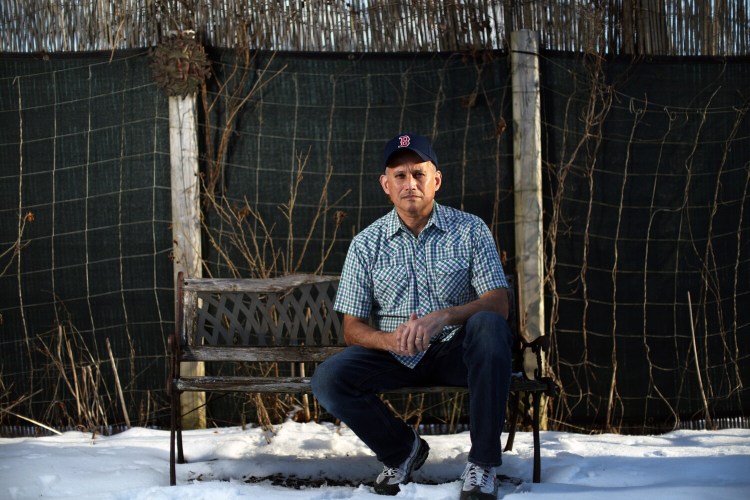Three Whole Foods Market workers are speaking out about what they describe as unsafe conditions at the Portland store, saying its successful Amazon home delivery service is contributing to overcrowding that makes it difficult for customers and employees to maintain proper physical distancing.
Jose Linares, who has worked at the store for a year, said Whole Foods doesn’t count “pickers” – employees who are shopping for home delivery customers – toward the number of shoppers allowed in the store, although their presence can clog aisles. He said it’s not unusual for 20 to 30 pickers to be working at a time, and they have no separate space to seal the bags and apply stickers to them. That means it’s done on the main floor of the store, further clogging the aisles, he said.
Linares also said that store management is doing a poor job of communicating with employees about COVID-19 infections among workers. When an employee tests positive, Linares said, staff members receive a text notification, but the name of the worker who contracted the virus is omitted. The notifications say managers will speak to anyone who might have had close regular contact with the employee, but Linares said he has seen no sign of that occurring.
Another employee said at least 13 Whole Foods employees have tested positive for the virus, including five who tested positive from Dec. 15-20, according to an affidavit submitted in response to a lawsuit filed by the Portland Regional Chamber of Commerce over Portland’s successful $18-an-hour emergency minimum wage referendum. The affidavit said Whole Foods does not require employees to tell a manager if they have tested positive or been in contact with someone who has.
Customers outside the store this week were split on whether the store seemed overly crowded.
Tom Major of Falmouth said the store seemed crowded to him but he wasn’t overly worried about contracting the virus. Major laughed, however, as he said that, noting that he was concerned enough to wipe down the handle of his shopping cart before returning it to the store.
Maureen Cummings of Portland didn’t think the store was crowded and would have been happier if it had been.
“I miss the hubbub,” she said, saying she longed for the energy created by other shoppers and workers while shopping in the pre-pandemic days.
A spokesman for Whole Foods, which was purchased by Amazon in 2017, said the company has had physical distancing and crowd control procedures since March and requires temperature checks for employees and face masks for all. He also said that stores have enhanced cleaning and disinfecting protocols, and that the company audits those practices regularly to make sure they’re being followed.
The spokesman also said employees are notified if a co-worker tests positive, and that the company conducts contact tracing and maintains communication about the situation with employees.
He did not respond to a request to discuss the Portland store specifically.
After the Amazon acquisition, and with the onset of the pandemic this year, Whole Foods has heavily promoted its grocery delivery service. It’s available to “Amazon Prime” customers, who pay an annual fee for things such as streaming video content and faster shipping options for items purchased online.
In the lawsuit, affidavits filed by employees Caleb Horton and Mario Roberge-Reyes said back-of-store facilities are cramped and poorly ventilated. For instance, the workers clock in for their shifts in a cramped hallway, they said, and the break room, where some employees eat lunch without masks on, is small and poorly ventilated, and physical distancing is not enforced, one affidavit said.
Linares was critical of Whole Foods for not reporting cases in which employees received a positive test result, but a state official said an employer could violate a worker’s rights by identifying a confirmed case among its employees.
Robert Long, spokesman for the Maine Center for Disease Control and Prevention, said the agency is informed of positive results from testing centers. He said the CDC investigates possible places where a person who has tested positive might have exposed or transmitted the disease to others, including workplaces, but the agency doesn’t identify who has a confirmed case of COVID-19 because that would violate the individual’s privacy rights.
“A case investigator would encourage someone who tests positive to provide information about individuals, including co-workers, with whom that person had close contact,” he said.
As for Linares, he’s hoping that shining a light on some of the issues at the store will lead to improvements.
He said he doesn’t consider himself a “disgruntled employee,” but one who is hoping for positive change.
“I believe Whole Foods Market has an obligation to care about the safety of their customers and employees,” Linares said. “That’s what the motivational signs they have inside and outside their store publicly claim.”
Copy the Story LinkSend questions/comments to the editors.




Success. Please wait for the page to reload. If the page does not reload within 5 seconds, please refresh the page.
Enter your email and password to access comments.
Hi, to comment on stories you must . This profile is in addition to your subscription and website login.
Already have a commenting profile? .
Invalid username/password.
Please check your email to confirm and complete your registration.
Only subscribers are eligible to post comments. Please subscribe or login first for digital access. Here’s why.
Use the form below to reset your password. When you've submitted your account email, we will send an email with a reset code.